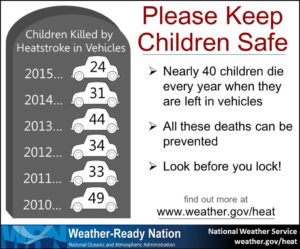This biweekly column is sponsored by the Arlington Office of Emergency Management.
If the last time you got in your car you thought it was hot enough to bake a cake, you’re not far off! The internet is full of recipes for dashboard cookies and pizza, helping to keep your house cool and energy costs down when the heat rises, while also fueling your sugar tooth. But if your car can warm up enough to bake cookies, that means temperatures (inside and outside of your car) may also be dangerous.
In fact, heat emergencies kill more people every year in the US than any other natural disaster. Heat cramps, heat exhaustion and heat stroke are caused by prolonged exposure to heat, loss of fluids and increased body temperatures, and, if left untreated, can be deadly. Consider:
 Older adults, children, and males are more likely to die from a heat-related emergency. According to NOAA, adults aged 50 or older account for 73 percent of heat-related deaths nationally.
Older adults, children, and males are more likely to die from a heat-related emergency. According to NOAA, adults aged 50 or older account for 73 percent of heat-related deaths nationally.
Men, who account for 71 percent of heat-related deaths nationally, have an increased risk of death due to higher rates of sweating. During a heat-emergency:
- Drink plenty of fluids and wear cool, lose clothing
- Use a buddy system when working outside or participating in strenuous activity
Those living alone face a significantly higher risk of death during a heat emergency. Following the Derecho in 2012, when temperatures soared to 100F and nearly 3.8 million people were without power in Virginia and Maryland, 75 percent of the heat-related victims were unmarried or living alone.
- If you live alone, set up a buddy to check on you twice a day during a heat emergency
- Check on neighbors, friends and family at least twice a day during a heat emergency to make sure they’re okay
The most dangerous place during a heat wave is in a home with little or no air conditioning. A fan can provide some comfort, but once temperatures rise into the 90s it will not prevent heat-related illness, such as heat exhaustion or stroke. Even just a few hours’ relief in air conditioning can help to cool the body significantly. During a heat wave, consider:
- Visiting the library, community center, mall or movie theater to escape your home
- Take a cool shower, bath or go to a pool or sprayground
 The temperature in a car can increase to 114F within 30 minutes when the air temperature is just 80F (and reach 123F within an hour). Even with the windows cracked, the temperature in your car can increase 20F within 10 minutes. Heat exhaustion and stroke, a life-threatening condition, can set in when your body temperature reaches 104F. Children are particularly at risk because are not able to regulate their body temperature as well as adults.
The temperature in a car can increase to 114F within 30 minutes when the air temperature is just 80F (and reach 123F within an hour). Even with the windows cracked, the temperature in your car can increase 20F within 10 minutes. Heat exhaustion and stroke, a life-threatening condition, can set in when your body temperature reaches 104F. Children are particularly at risk because are not able to regulate their body temperature as well as adults.
- Never leave a child or animal in a vehicle, even with the windows cracked
- Form regular habits to help you remember that you have a child in the car, such as leaving your briefcase, purse or lunch in the back seat


